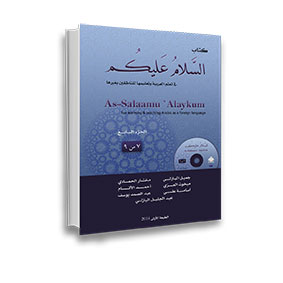After completing this textbook, the learners will be able to:
1. Participate in discussions and debates on cultural topics/issues, and abstract values of Arab & international cultures. They can explain their points of views on the issues presented in this textbook including: some aspect of Islamic and Arab culture, education, organizations, natural resources, outstanding scholars /figures, journalism, tourism, prose, and literary signatures.
2. Define the author’s point of view, criticize it, agree or disagree with the author and can support their opinions with logical arguments.
3. Comprehend authentic texts they hear without modifying them.
4. Express orally or in written their opinion on the issues and topics presented through the book, making use of the internet environment to prepare oral and written summaries and presentations .
5. Exercise morphological rules including: Derivations of Verbs with hamzah, Al – Majmo’e, Allafeef al-mafrooq, derivations of (وصى , سوّى, ساوى), Derivations of (أوصى, أخفى, ألقى, أراد), Derivations of (تبنى، تولّى، تعالى، تساوى), Derivations of (انقضى، انطوى، انقاد، اقتضى، احتوى، اختار), derivations of .(استغنى، استوحى، استطاع)
6. Comprehend new grammatical rules including: past simple, past perfect, past continuous, and future of the past.
7. Practice writing articles according to the article outline, and using appropriate connectors.
8. Form formal contracts between two parties.
9. Write attention notices and alerts that are given to employees.
10. Master writing a written announcement about religious and social occasions fulfilling the necessary components.
11. Practice writing official letters to apply for a job, and informal letters among family members and friends.
12. Realize cultural aspects in accordance with the themes presented in the textbook such as: the occasion of the prophet’s birthday, Hijra, agreements after Hudaibiyah, the wealth of salt in Mali, gold, agriculture and dams in Yemen, coming occasions into Arab culture, Queen of Sheba, Shura’a as mentioned in Quran, the high position of poets and poetry in the Arab culture, famous literary speeches.
13. Practice new learning strategies such as: a) searching the internet to get specific information from the original source, then sharing such information with friends on media sites, b) gathering detailed information about religious and social occasions of Arab culture and comparing them to occasions from the learners’ culture, c) summarizing short authentic videos and prepare presentations in the classroom, d) familiarizing themselves with several types of formal and informal letters, and e) active participation in the debates organized under the teacher’s supervision.

